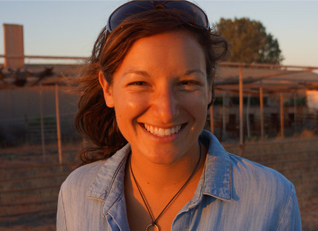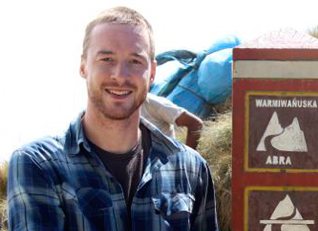What can social interactions among male bottlenose dolphins tell us about ourselves? Which genetic factors contribute to variability in the childhood and adolescent brain and mind? CARTA is pleased to introduce you to the first two recipients of the Merle-Smith Fellowship Award, who are probing these questions.
 |
 |
| Whitney Friedman, Merle-Smith Fellow, Cognitive Science
Whitney’s dissertation research focuses on social interactions among male bottlenose dolphins in Shark Bay, Western Australia as they negotiate a nested structure of alliances critical for reproductive success. These relationships have complex dynamics that may be more similar to those among humans than to any extant primate species – making them an important but often overlooked model species for understanding the evolution of complex cognition. |
Andrew Schork, Merle-Smith Fellow, Cognitive Science
As a graduate student in Cognitive Science, Andrew’s research is focused on mapping natural genetic variation in humans to variability in brain structure, cognitive abilities and risk for psychiatric conditions. His goal is to frame this research in a developmental context, uncovering genetic factors which contribute to variability in the course of brain and cognitive development across childhood and adolescence. |
The Merle-Smith Fellowship was established to support the participation of the most highly motivated students in the Graduate Specialization Track in Anthropogeny. The award honors Annette Merle-Smith, who has been supporting CARTA from the beginning, lending her generosity first to CARTA’s symposia, then to its Museum of Primatology, and now to the Specialization Track in Anthropogeny.
Mrs. Merle-Smith remarked that she is particularly pleased to support the graduate students in the Anthropogeny program, knowing the value and impact this transdisciplinary education has not only on their research and future career, but also on their outlook on life.
In keeping with Mrs. Merle-Smith’s high standards, this prestigious fellowship will be awarded to those students who demonstrate the most involvement in, and commitment to, the Anthropogeny Specialization Track, and we are delighted to announce this year’s Merle-Smith Fellowship Awardees: Whitney Friedman and Andrew Schork.
Currently, the Faculty of Anthropogeny offers this training to PhD students from eight different disciplines: anthropology, biology, biomedical sciences, cognitive science, linguistics, neurosciences, psychology, and visual arts. Students enrolled in the Specialization must complete a curriculum of required courses on Human Origins, participate in CARTA’s scientific symposia and ensuing discussions, network with researchers from around the world, and cross-train with peers from a variety of disciplines.
The interaction with faculty and students from different disciplines provides exposure to perspectives spanning social and natural sciences. These students will no doubt draw on this experience as they embark on future careers, where the ability to mediate between different types of knowledge bases is becoming increasingly important.
Congratulations to Whitney and Andrew on winning this award!

